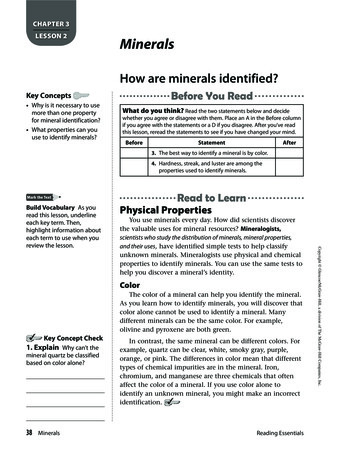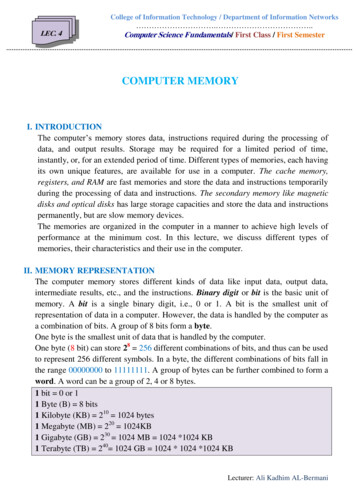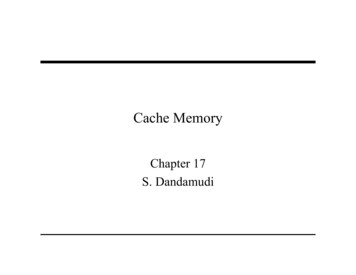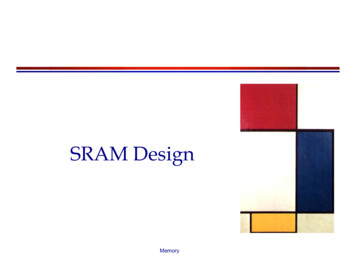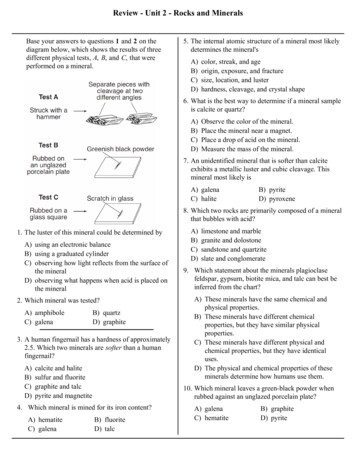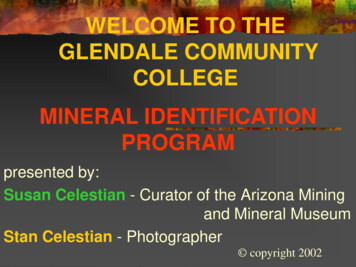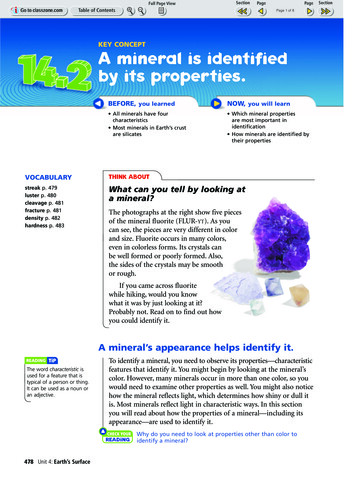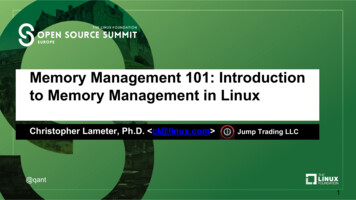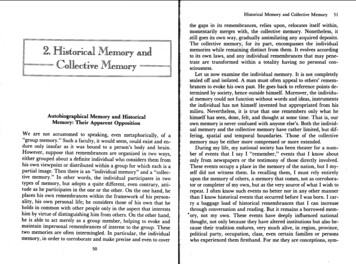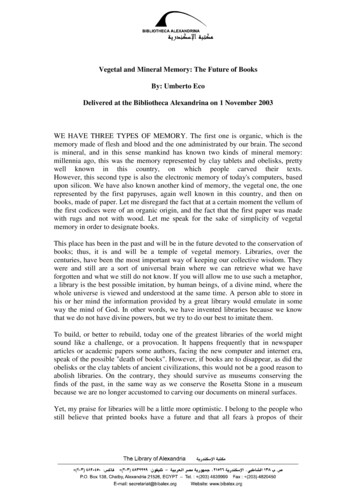
Transcription
Vegetal and Mineral Memory: The Future of BooksBy: Umberto EcoDelivered at the Bibliotheca Alexandrina on 1 November 2003WE HAVE THREE TYPES OF MEMORY. The first one is organic, which is thememory made of flesh and blood and the one administrated by our brain. The secondis mineral, and in this sense mankind has known two kinds of mineral memory:millennia ago, this was the memory represented by clay tablets and obelisks, prettywell known in this country, on which people carved their texts.However, this second type is also the electronic memory of today's computers, basedupon silicon. We have also known another kind of memory, the vegetal one, the onerepresented by the first papyruses, again well known in this country, and then onbooks, made of paper. Let me disregard the fact that at a certain moment the vellum ofthe first codices were of an organic origin, and the fact that the first paper was madewith rugs and not with wood. Let me speak for the sake of simplicity of vegetalmemory in order to designate books.This place has been in the past and will be in the future devoted to the conservation ofbooks; thus, it is and will be a temple of vegetal memory. Libraries, over thecenturies, have been the most important way of keeping our collective wisdom. Theywere and still are a sort of universal brain where we can retrieve what we haveforgotten and what we still do not know. If you will allow me to use such a metaphor,a library is the best possible imitation, by human beings, of a divine mind, where thewhole universe is viewed and understood at the same time. A person able to store inhis or her mind the information provided by a great library would emulate in someway the mind of God. In other words, we have invented libraries because we knowthat we do not have divine powers, but we try to do our best to imitate them.To build, or better to rebuild, today one of the greatest libraries of the world mightsound like a challenge, or a provocation. It happens frequently that in newspaperarticles or academic papers some authors, facing the new computer and internet era,speak of the possible "death of books". However, if books are to disappear, as did theobelisks or the clay tablets of ancient civilizations, this would not be a good reason toabolish libraries. On the contrary, they should survive as museums conserving thefinds of the past, in the same way as we conserve the Rosetta Stone in a museumbecause we are no longer accustomed to carving our documents on mineral surfaces.Yet, my praise for libraries will be a little more optimistic. I belong to the people whostill believe that printed books have a future and that all fears à propos of their
disappearance are only the last example of other fears, or of milleniaristic terrorsabout the end of something, the world included.In the course of many interviews I have been obliged to answer questions of this sort:"Will the new electronic media make books obsolete? Will the Web make literatureobsolete? Will the new hypertextual civilization eliminate the very idea ofauthorship?" As you can see, if you have a well-balanced normal mind, these aredifferent questions and, considering the apprehensive mode in which they are asked,one might think that the interviewer would feel reassured when your answer is, "No,keep cool, everything is OK". Mistake. If you tell such people that books, literature,authorship will not disappear, they look desperate. Where, then, is the scoop? Topublish the news that a given Nobel Prize winner has died is a piece of news; to saythat he is alive and well does not interest anybody -- except him, I presume.WHAT I WANT TO DO TODAY is to try to unravel a skein of intertwinedapprehensions about different problems. To clarify our ideas about these differentproblems can also help us to understand better what we usually mean by book, text,literature, interpretation, and so on. Thus you will see how from a silly question manywise answers can be produced, and such is probably the cultural function of naiveinterviews.Let us start with an Egyptian story, even though one told by a Greek.According to Plato in Phaedrus when Hermes, or Theut, the alleged inventor ofwriting, presented his invention to the Pharaoh Thamus, the Pharaoh praised such anunheard of technique supposed to allow human beings to remember what they wouldotherwise forget. But Thamus was not completely happy. "My skillful Theut," he said,"memory is a great gift that ought to be kept alive by continuous training. With yourinvention people will no longer be obliged to train their memory. They will rememberthings not because of an internal effort, but by mere virtue of an external device."We can understand the preoccupation of Thamus. Writing, like any other newtechnological invention, would have made torpid the human power which it pretendedto substitute and reinforce. Writing was dangerous because it decreased the powers ofmind by offering human beings a petrified soul, a caricature of mind, a mineralmemory.Plato's text is ironical, naturally. Plato was writing down his argument against writing.But he was also pretending that his discourse was told by Socrates, who did not write(since he did not publish, he perished in the course of the academic fight.) Nowadays,nobody shares Thamus's preoccupations for two very simple reasons. First of all, weknow that books are not ways of making somebody else think in our place; on thecontrary, they are machines that provoke further thoughts. Only after the invention ofwriting was it possible to write such a masterpiece of spontaneous memory as Proust'sA la Recherche du Temps Perdu. Secondly, if once upon a time people needed to traintheir memories in order to remember things, after the invention of writing they hadalso to train their memories in order to remember books. Books challenge and
improve memory; they do not narcotise it. However, the Pharaoh was instantiating aneternal fear: the fear that a new technological achievement could kill something thatwe consider precious and fruitful.I used the verb to kill on purpose because more or less 14 centuries later Victor Hugo,in his Notre Dame de Paris, narrated the story of a priest, Claude Frollo, looking insadness at the towers of his cathedral. The story of Notre Dame de Paris takes placesin the XVth century after the invention of printing. Before that, manuscripts werereserved to a restricted elite of literate persons, and the only thing to teach the massesabout the stories of the Bible, the life of Christ and of the Saints, the moral principles,even the deeds of national history or the most elementary notions of geography andnatural sciences (the nature of unknown peoples and the virtues of herbs or stones),was provided by the images of a cathedral. A mediaeval cathedral was a sort ofpermanent and unchangeable TV programme that was supposed to tell peopleeverything indispensable for their everyday life, as well as for their eternal salvation.Now, however, Frollo has on his table a printed book, and he whispers "ceci tueracela": this will kill that, or, in other words, the book will kill the cathedral, thealphabet will kill images. The book will distract people from their most importantvalues, encouraging unnecessary information, free interpretation of the Scriptures,insane curiosity.During the sixties, Marshall McLuhan wrote his book The Gutenberg Galaxy, wherehe announced that the linear way of thinking supported by the invention of printingwas on the verge of being substituted by a more global way of perceiving andunderstanding through TV images or other kinds of electronic devices. If notMcLuhan, then certainly many of his readers pointed their finger first at a TV screenand then to a printed book, saying "this will kill that". Were McLuhan still among us,today he would have been the first to write something like "Gutenberg strikes back".Certainly, a computer is an instrument by means of which one can produce and editimages, certainly instructions are provided by means of icons; but it is equallycertainly that the computer has become first of all an alphabetic instrument. On itsscreen there run words and lines, and in order to use a computer you must be able towrite and to read.Are there differences between the first Gutenberg Galaxy and the second one? Many.First of all, only the archaeological word processors of the early eighties provided asort of linear written communication. Today, computers are no longer linear in so faras they display a hypertextual structure.Curiously enough, the computer was born as a Turing machine, able to make a singlestep at a time, and in fact, in the depths of the machine, language still works in thisway, by a binary logic, of zero-one, zero-one. However, the machine's output is nolonger linear: it is an explosion of semiotic fireworks. Its model is not so much astraight line as a real galaxy where everybody can draw unexpected connectionsbetween different stars to form new celestial images at any new navigation point.
YET IT IS EXACTLY AT THIS POINT that our unraveling activity must startbecause by hypertextual structure we usually mean two very different phenomena.First, there is the textual hypertext. In a traditional book one must read from left toright (or right to left, or up to down, according to different cultures) in a linear way.One can obviously skip through the pages, one -- once arrived at page 300 -- can goback to check or re- read something at page 10 -- but this implies physical labour. Incontrast to this, a hypertextual text is a multidimensional network or a maze in whichevery point or node can be potentially connected with any other node.Second, there is the systemic hypertext. The WWW is the Great Mother of AllHypertexts, a world-wide library where you can, or you will in short time, pick up allthe books you wish. The Web is the general system of all existing hypertexts.Such a difference between text and system is enormously important, and we shallcome back to it. For the moment, let me liquidate the most naive among thefrequently asked questions, in which this difference is not yet so clear. But it will bein answering this first question that we will be able to clarify our further point. Thenaive question is: "Will hypertextual diskettes, the internet, or multimedia systemsmake books obsolete?" With this question we have arrived at the final chapter in ourthis-will-kill-that story. But even this question is a confused one, since it can beformulated in two different ways: (a) will books disappear as physical objects, and (b)will books disappear as virtual objects?Let me first answer the first question. Even after the invention of printing, books werenever the only instrument for acquiring information. There were also paintings,popular printed images, oral teaching, and so on. Simply, books have proved to be themost suitable instrument for transmitting information. There are two sorts of book:those to be read and those to be consulted. As far as books-to-be-read are concerned,the normal way of reading them is the one that I would call the "detective story way".You start from page one, where the author tells you that a crime has been committed,you follow every path of the detection process until the end, and finally you discoverthat the guilty one was the butler. End of the book and end of your readingexperience. Notice that the same thing happens even if you read, let us say, aphilosophical treatise. The author wants you to open the book at its first page, tofollow the series of questions he proposes, and to see how he reaches certain finalconclusions. Certainly, scholars can re-read such a book by jumping from one page toanother, trying to isolate a possible link between a statement in the first chapter andone in the last. They can also decide to isolate, let us say, every occurrence of theword "idea" in a given work, thus skipping hundreds of pages in order to focus theirattention only on passages dealing with that notion. However, these are ways ofreading that the layman would consider as unnatural.Then they are books to be consulted, like handbooks and encyclopaedias.Encyclopaedias are conceived in order to be consulted and never read from the first tothe last page. A person reading the Encyclopaedia Britannica every night beforesleeping, from the first to the last page, would be a comic character. Usually, onepicks up a given volume of an encyclopaedia in order to know or to remember when
Napoleon died, or what is the chemical formula for sulphuric acid. Scholars useencyclopaedias in a more sophisticated way. For instance, if I want to know whether itwas possible or not that Napoleon met Kant, I have to pick up the volume K and thevolume N of my encyclopaedia: I discover that Napoleon was born in 1769 and diedin 1821, Kant was born in 1724 and died in 1804, when Napoleon was alreadyemperor. It is therefore not impossible that the two met. In order to confirm this Iwould probably need to consult a biography of Kant, or of Napoleon, but in a shortbiography of Napoleon, who met so many persons in his life, a possible meeting withKant can be disregarded, while in a biography of Kant a meeting with Napoleonwould be recorded. In brief, I must leaf through many books on many shelves of mylibrary; I must take notes in order to compare later all the data I have collected. Allthis will cost me painful physical labour.Yet, with hypertext instead I can navigate through the whole net-cyclopaedia. I canconnect an event registered at the beginning with a series of similar eventsdisseminated throughout the text; I can compare the beginning with the end; I can askfor a list of all words beginning by A; I can ask for all the cases in which the name ofNapoleon is linked with the one of Kant; I can compare the dates of their births anddeaths -- in short, I can do my job in a few seconds or a few minutes.Hypertexts will certainly render encyclopaedias and handbooks obsolete.Yesterday, it was possible to have a whole encyclopaedia on a CD-ROM; today, it ispossible to have it on line with the advantage that this permits cross references and thenon-linear retrieval of information. All the compact disks, plus the computer, willoccupy one fifth of the space occupied by a printed encyclopaedia. A printedencyclopaedia cannot be easily transported as a CD-ROM can, and a printedencyclopaedia cannot be easily updated. The shelves today occupied at my home aswell as in public libraries by metres and metres of encyclopaedias could be eliminatedin the near future, and there will be no reason to complain at their disappearance. Letus remember that for a lot of people a multivolume encyclopaedia is an impossibledream, not, or not only, because of the cost of the volumes, but because of the cost ofthe wall where the volumes are shelved. Personally, having started my scholarlyactivity as a medievalist I would like to have at home the 221 volumes of Migne'sPatrologia Latina. This is very expensive, but I could afford it. What I cannot afford isa new apartment in which to store 221 huge books without being obliged to eliminateat least 500 other normal tomes.Yet, can a hypertextual disk or the WWW replace books to be read? Once again wehave to decide whether the question concerns books as physical or as virtual objects.Once again let us consider the physical problem first.Good news: books will remain indispensable, not only for literature but for anycircumstances in which one needs to read carefully, not only in order to receiveinformation but also to speculate and to reflect about it. To read a computer screen isnot the same as to read a book. Think about the process of learning a new computerprogramme. Usually, the programme is able to display on the screen all the
instructions you need. But usually users who want to learn the programme either printthe instructions and read them as if they were in book form, or they buy a printedmanual. It is possible to conceive of a visual programme that explains very well howto print and bind a book, but in order to get instructions on how to write, or how touse, a computer programme, we need a printed handbook.After having spent 12 hours at a computer console, my eyes are like two tennis balls,and I feel the need of sitting down comfortably in an armchair and reading anewspaper, or maybe a good poem. Therefore, I think that computers are diffusing anew form of literacy, but they are incapable of satisfying all the intellectual needsthey are stimulating. Please remember that both the Hebrew and the early Arabcivilizations were based upon a book and this is not independent of the fact that theywere both nomadic civilizations. The Ancient Egyptians could carve their records onstoneobelisks: Moses and Muhammad could not. If you want to cross the Red Sea, or to gofrom the Arabian peninsula to Spain, a scroll is a more practical instrument forrecording and transporting the Bible or the Koran than is an obelisk. This is why thesetwo civilizations based upon a book privileged writing over images. But books alsohave another advantage in respect to computers. Even if printed on modern acidpaper, which lasts only 70 years or so, they are more durable than magnetic supports.Moreover, they do not suffer from power shortages and black-outs, and they are moreresistant to shocks.Up to now, books still represent the most economical, flexible, wash-and-wear way totransport information at a very low cost. Computer communication travels ahead ofyou; books travel with you and at your speed. If you are shipwrecked on a desertisland, where you don't have the option of plugging in a computer, a book is still avaluable instrument. Even if your computer has solar batteries, you cannot easily readit while lying in a hammock. Books are still the best companions for a shipwreck, orfor the day after the night before. Books belong to those kinds of instruments that,once invented, have not been further improved because they are already alright, suchas the hammer, the knife, spoon or scissors.TWO NEW INVENTIONS, however, are on the verge of being industrially exploited.One is printing on demand: after scanning the catalogues of many libraries orpublishing houses a reader can select the book he needs, and the operator will push abutton, and the machine will print and bind a single copy using the font the readerlikes. This will certainly change the whole publishing market. It will probablyeliminate bookstores, but it will not eliminate books, and it will not eliminatelibraries, the only places where books can be found in order to scan and reprint them.Simply put: every book will be tailored according to the desires of the buyer, ashappened with old manuscripts.The second invention is the e-book where by inserting a micro- cassette in the book'sspine or by connecting it to the internet one can have a book printed out in front of us.Even in this case, however, we shall still have a book, though as different from our
current ones as ours are different from old manuscripts on parchment, and as the firstShakespeare folio of 1623 is different from the last Penguin edition. Yet, up to now ebooks have not proved to be commercially successful as their inventors hoped. I havebeen told that some hackers, grown up on computers and unused to browsing books,have finally read great literary masterpieces on e-books, but I think that thephenomenon remains very limited. In general, people seem to prefer the traditionalway of reading a poem or a novel on printed paper. E-books will probably prove to beuseful for consulting information, as happens with dictionaries or special documents.They will probably help students obliged to bring with them ten or more books whenthey go to school, but they will not substitute for other kinds of books that we love toread in bed before sleep, for example.Indeed, there are a lot of new technological devices that have not made previous onesobsolete. Cars run faster than bicycles, but they have not rendered bicycles obsolete,and no new technological improvements can make a bicycle better than it was before.The idea that a new technology abolishes a previous one is frequently too simplistic.Though after the invention of photography painters did not feel obliged to serve anylonger as craftsmen reproducing reality, this did not mean that Daguerre's inventiononly encouraged abstract painting. There is a whole tradition in modern painting thatcould not have existed without photographic models: think, for instance, of hyperrealism. Here, reality is seen by the painter's eye through the photographic eye. Thismeans that in the history of culture it has never been the case that something hassimply killed something else. Rather, a new invention has always profoundly changedan older one.To conclude on this theme of the inconsistency of the idea of the physicaldisappearance of books, let us say that sometimes this fear does not only concernbooks but also printed material in general. Alas, if by chance one hoped thatcomputers, and especially word processors, would contribute to saving trees, then thatwas wishful thinking. Instead, computers encourage the production of printedmaterial. The computer creates new modes of production and diffusion of printeddocuments. In order to re- read a text, and to correct it properly, if it is not simply ashort letter, one needs to print it, then to re-read it, then to correct it at the computerand to reprint it again. I do not think that one would be able to write a text of hundredsof pages and to correct it properly without reprinting it many times.Today there are new hypertextual poetics according to which even a book-to-read,even a poem, can be transformed to hypertext. At this point we are shifting toquestion two, since the problem is no longer, or not only, a physical one, but ratherone that concerns the very nature of creative activity, of the reading process, and inorder to unravel this skein of questions we have first of all to decide what we mean bya hypertextual link.Notice that if the question concerned the possibility of infinite, or indefinite,interpretations on the part of the reader, it would have very little to do with theproblem under discussion. Rather, that would have to do with the poetics of a Joyce,
for example, who thought of his book Finnegans Wake as a text that could be read byan ideal reader affected by an ideal insomnia. This question concerns the limits ofinterpretation, of deconstructive reading and of over-interpretation, to which I havedevoted other writings. No: what are presently under consideration are cases in whichthe infinity, or at least the indefinite abundance of interpretations, are due not only tothe initiative of the reader, but also to the physical mobility of the text itself, which isproduced just in order to be re-written. In order to understand how texts of this genrecan work we should decide whether the textual universe we are discussing is limitedand finite, limited but virtually infinite, infinite but limited, or unlimited and infinite.First of all, we should make a distinction between systems and texts. A system, forinstance a linguistic system, is the whole of the possibilities displayed by a givennatural language. A finite set of grammatical rules allows the speaker to produce aninfinite number of sentences, and every linguistic item can be interpreted in terms ofother linguistic or other semiotic items -- a word by a definition, an event by anexample, an animal or a flower by an image, and so on and so forth.Take an encyclopaedic dictionary, for example. This might define a dog as a mammal,and then you have to go to the entry mammal, and if there mammals are defined asanimals you must look for the entry animal, and so on. At the same time, theproperties of dogs can be exemplified by images of dogs of different kinds; if it is saidthat a certain kind of dog lives in Lapland you must then go to the entry on Lapland toknow where it is, and so on. The system is finite, an encyclopaedia being physicallylimited, but virtually unlimited in the sense you can circumnavigate it in a spiral-likemovement, ad infinitum. In this sense, certainly all conceivable books are comprisedby and within a good dictionary and a good grammar. If you are able to use anEnglish dictionary well you could write Hamlet, and it is by mere chance thatsomebody did it before you. Give the same textual system to Shakespeare and to aschoolboy, and they have the same odds of producing Romeo and Juliet.Grammars, dictionaries and encyclopaedias are systems: by using them you canproduce all the texts you like. But a text itself is not a linguistic or an encyclopaedicsystem. A given text reduces the infinite or indefinite possibilities of a system to makeup a closed universe. If I utter the sentence, "This morning I had for breakfast.", forexample, the dictionary allows me to list many possible items, provided they are allorganic. But if I definitely produce my text and utter, "This morning I had forbreakfast bread and butter", then I have excluded cheese, caviar, pastrami and apples.A text castrates the infinite possibilities of a system. The Arabian Nights can beinterpreted in many, many ways, but the story takes place in the Middle East and notin Italy, and it tells, let us say, of the deeds of Ali Baba or of Scheherazade and doesnot concern a captain determined to capture a white whale or a Tuscan poet visitingHell, Purgatory and Paradise.Take a fairy tale, like Little Red Riding Hood. The text starts from a given set ofcharacters and situations -- a little girl, a mother, a grandmother, a wolf, a wood -- andthrough a series of finite steps arrives at a solution. Certainly, you can read the fairy
tale as an allegory and attribute different moral meanings to the events and to theactions of the characters, but you cannot transform Little Red Riding Hood intoCinderella.Finnegans Wake is certainly open to many interpretations, but it is certain that it willnever provide you with a demonstration of Fermat's last theorem, or with thecomplete bibliography of Woody Allen. This seems trivial, but the radical mistake ofmany deconstructionists was to believe that you can do anything you want with a text.This is blatantly false.Now suppose that a finite and limited text is organised hypertextually by many linksconnecting given words with other words. In a dictionary or an encyclopaedia theword wolf is potentially connected to every other word that makes up part of itspossible definition or description (wolf is connected to animal, to mammal toferocious, to legs, to fur, to eyes, to woods, to the names of the countries in whichwolves exist, etc.). In Little Red Riding Hood, the wolf can be connected only withthe textual sections in which it shows up or in which it is explicitly evoked. The seriesof possible links is finite and limited. How can hypertextual strategies be used to"open" up a finite and limited text?The first possibility is to make the text physically unlimited, in the sense that a storycan be enriched by the successive contributions of different authors and in a doublesense, let us say either two-dimensionally or three-dimensionally. By this I mean thatgiven, for instance, Little Red Riding Hood, the first author proposes a startingsituation (the girl enters the wood) and different contributors can then develop thestory one after the other, for example, by having the girl meet not the wolf but AliBaba, by having both enter an enchanted castle, having a confrontation with a magiccrocodile, and so on, so that the story can continue for years. But the text can also beinfinite in the sense that at every narrative disjunction, for instance, when the girlenters the wood, many authors can make many different choices. For one author, thegirl may meet Pinocchio, for another she may be transformed into a swan, or enter thePyramids and discover the treasury of the son of Tutankhamen. This is today possible,and you can find on the Net some interesting examples of such literary games.AT THIS POINT one can raise a question about the survival of the very notion ofauthorship and of the work of art, as an organic whole. And I want simply to informmy audience that this has already happened in the past without disturbing eitherauthorship or organic wholes. The first example is that of the Italian Commediadell'arte, in which upon a canovaccio, that is, a summary of the basic story, everyperformance, depending on the mood and fantasy of the actors, was different fromevery other so that we cannot identify any single work by a single author calledArlecchino servo di due padroni and can only record an uninterrupted series ofperformances, most of them definitely lost and all certainly different one fromanother.Another example would be a jazz jam session. We may believe that there was once aprivileged performance of Basin Street Blues while only a later recorded session has
survived, but we know that this is untrue. There were as many Basin Street Blues asthere were performances of it, and there will be in future a lot of them that we do notknow as yet, as soon as two or more performers meet again and try out their personaland inventive version of the original theme. What I want to say is that we are alreadyaccustomed to the idea of the absence of authorship in popular collective art in whichevery participant adds something, with experiences of jazz-like unending stories.Suchways of implementing free creativity are welcome and make up part of the culturaltissue of society.Yet, there is a difference between implementing the activity of producing infinite andunlimited texts and the existence of already produced texts, which can perhaps beinterpreted in infinite ways but are physically limited. In our same contemporaryculture we accept and evaluate, according to different standards, both a newperformance of Beethoven's Fifth a
Vegetal and Mineral Memory: The Future of Books By: Umberto Eco Delivered at the Bibliotheca Alexandrina on 1 November 2003 WE HAVE THREE TYPES OF MEMORY. The first one is organic, which is the memory made of flesh and blood and the one administrated by our brain. The second is mineral, and in this sense mankind has known two kinds of mineral memory: millennia ago, this was the memory .
